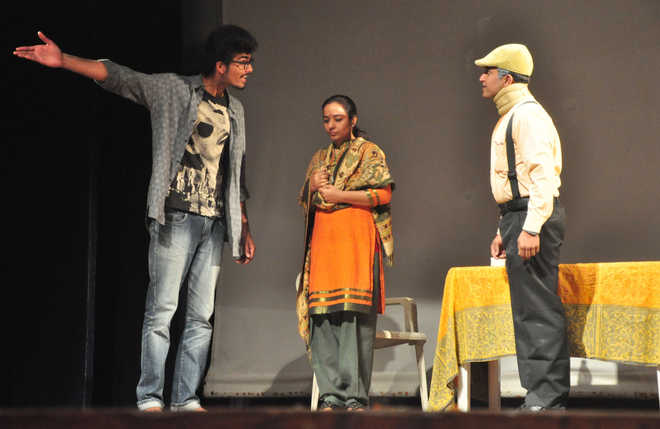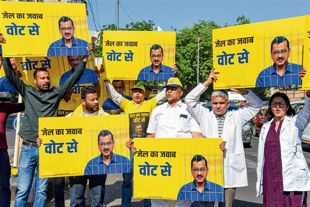
Like-minded: Mohan Rakesh's (R) play, Adhe Adhure, has often been compared to Henrik Ibsen’s A Doll’s House
Pankaj Kumar Deo
When you pick up a book that contains literary works that were originally written in what’s called your ‘first’ language’ or Hindi but now have been translated into what’s apparently your ‘second language’ or English, you are bound to have apprehensions. For, literary translation is never literal and entails a complex linguistic transformation of the writer’s text into something authentic for the reader. These apprehensions are disproved as you dig into Another Life: Thirteen Stories and a Play by Mohan Rakesh.
As the preface says, the book is an attempt to present Mohan Rakesh in English for those who do not have access to Hindi. The collection contains eclectic samples from Rakesh’s oeuvre. Different people have translated different works in the collection, but each comes to us as if it has been trans-created and not translated. The book also portrays the author up-close via an interview, which offers an insight into the author’s literary backdrop and an understanding of his views.
The independence of India brought in its wake a ferment in the minds of people, a distinct craving for something new that had the sparkle of originality. Consequently, a literary revolution was in the making in the 1950s, and a writer set out to change the course of Hindi literature’s three key genres—short story, novel and drama. And the writer was Mohan Rakesh who not only pioneered the Nai Kahani (New Short Story) movement but also ushered in modernism in Hindi drama. Mohan, along with Rajendra Yadav and Kamleshwar, was in the vanguard of this literary change. Premchand’s fiction was the point of departure for the New Short Story movement, as Mohan himself explains in the interview at the end of the book.
Mohan had obtained Master’s degrees in both Hindi and English, but he chose to write in Hindi. Thus, his creative outlook was initially shaped by global literary movements such as existentialism, alienation and absurdism. However, as a writer he soon outgrew those influences, as is borne out by his writings; he experimented with both form and content in his short stories and recast those influences in a new mould.
The protagonists in his stories are usually anti-heroes rather than heroes. Not only the characters were de-romanticised, but also the plot usually had no formal beginning, middle and end. The mind of the character, caught in the vortex of emotions caused by circumstances often beyond control, is streamed through words. Once the reader has gained insight into the protagonist’s mind and understood the broad theme that runs as an undercurrent in the story, he or she may be suddenly left stranded since there is no formal end in sight, as in the story, A Living. His short stories in this collection seem vignettes of life presented enticingly.
As a writer, he endeavours to discover a creative language of ‘being rather than knowing’. For example, in Mohan Rakesh: A Self-Portrait, the reader gets to peep inside the protagonist’s mind: “Hey, Paro, you want some sugar cane? Making me stick pleasantly close to her, a girl ten years older kisses me … pages torn to shreds …a song swimming in the night breeze … shivering shadows….” One can clearly see the influence of psychological novel’s stream-of-consciousness technique at work, which was very much in vogue at that time. You also come across a story within a story such as in Safety Pin, where a character is telling a story, which serves as a subtext.
The only play included in the collection is Adhe Adhure, which was a high point in Rakesh’s creative life. For, he reaches such psychological depths in the characterisation of its dramatis personae that he is often put at par with the likes of Henrik Ibsen. No wonder this play has often been compared with Ibsen’s A Doll’s House. Adhe Adhure is a purposeful subversion of earlier literary models employed by Hindi playwrights (Jayshankar Prashad, Bharatendu Harishchandra, et al), where the protagonist was often a historical character with heroic traits. Mohan introduced the concept of anti-hero — characters shorn of any heroic traits — into modern Hindi drama. The central protagonist in Adhe Adhure is a woman whose husband considers himself a failure in his life and is kind of an anti-hero. It’s the woman who is the breadwinner for the family and her relationship with four men is a kind of modern day polyandry. Mohan wanted the same person to play all the four characters perhaps to underscore that each one is a different facet of the same personality.
The best part of the book comes at the end — a no-holds-barred interview with Mohan. He not only expounds his ideas of literature but also does not mince words when it comes to talking about a writer’s commitment to an ideology. Although most of those associated with the Nayi Kahani had a Leftist orientation, Mohan seems to plough his own lonely furrow in his literary pursuit.
His commitment is to his craft, to his awareness of “emerging realities” rather than to any ideology. He says that “when people talk of progressivism or Marxist ideology, they talk in terms of certain slogans; they talk in terms writers going by certain manifestoes or trying to abide by dictates of a particular group in a particular ruling party. This is by the way exactly how a lot of insipid writing was done under the name of progressive writing.”
Overall, the book is a must-read for both, Hindi speakers and non-Hindi Speakers, because not only does it put a brilliant author in a global perspective through translation, but it also presents a panoramic view of 20th century Hindi literature through a writer’s eyes.



























